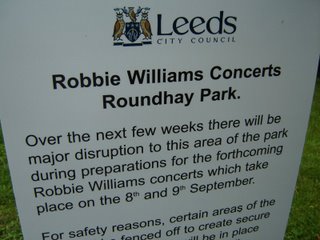I spend a lot of time with the over-eighties and in some ways they’re great. When they are open-minded and receptive to new ideas I want to cheer, and their bravery in the face of adversity is fantastic. There seems to be an acceptance by some of the medical profession that it’s okay to be in a lot of pain all the time if you’re over eighty: it’s somehow to be expected. Anyway, you're probably a bit forgetful so you might have forgotten that there was a whole hour last Thursday when you weren’t in pain at all. So that’s okay.
Much of the time I feel like a tiger – not defending my young, but defending my olds.
“I’m sorry, we can’t discuss your mother’s bank account until she gives us the pass numbers.”
“She is eighty-two and has had a stroke. She is very fit. She can walk five miles without noticing, which is probably more than you can do. However, she cannot say numbers in a sequence. Where do we go from here?”
“Errrr - - well - - “
Change to a different bank, was where we went.
But there are things old people do that are very, very exasperating: and I’m going to do them when I’m old, and so will you, unless we’re very different from all the old people I know.
I’m just going to tell you two of them, and they are CARS and RESTAURANTS.
The first thing is the seat belt thing.
You get in the car and you don’t do up your seat belt, because it’s a bit tricky.
“Have you fastened your seatbelt?” says the driver.
“No, but you’re all right, don’t worry.”
“It has to be fastened by law. Let me give you a hand.”
“Oh, no, I never bother and it’s never mattered. (Laughs) You’re not going to crash the car, are you?”
- - It can go on for minutes. It seems like hours.
However, once you get to your destination and the car stops, you make no attempt to either undo your seat belt or get out. You just carry on with the conversation. So the driver helpfully undoes it for you. You don’t appear to notice. You start a monologue with no pauses of the kind where a phrase like, “Oh look, here’s the park. Shall we get out?” can be inserted in the conversation.
- - It can go on for minutes. It seems like hours.
And then there’s the restaurant thing.
The prices are EXORBITANT. In Lyon’s Corner House during the war you could get a whole lunch for one and sixpence. How can they justify charging THIS MUCH for a sandwich?
Then, when it arrives, the portions are ENORMOUS. How could anyone eat so much? It’s just a terrible waste.
So for the next ten minutes it is impossible to have any kind of conversation because of the ceremony of the Handing Out of the Excess Food.
“ - - and there, in front of me, was a burglar.”
“Anyone want any carrots?”
“No thank you. And he was holding an axe.”
“Let me give you some peas.”
“No thank you, I’m fine. I nearly screamed, but luckily I kept my head and – “
“I’ve never seen so many chips. Here, have some. It’s ridiculous, the number of chips they give you.”
- - It can go on for minutes. It seems like hours.
And then, of course, they are amazed by how fast you eat.
“You can’t have finished already. I’ll be another half an hour eating this.”
Yes, yes, I know you will.
It must be hard to be eighty-something and find everything is awkward to open, and too heavy to lift, and happens too fast: and you know it can only get worse.
So it’s a defence mechanism. It’s not me that’s getting old, it’s hoovers that are getting heavier.
But it’s difficult to deal with – it’s hard to slow down to their pace, and not to get stressed by it all, and to pretend there’s all the time in the world.
For, of course, there isn’t much more time at all, not for them. When I find myself getting impatient, I think of that, and it does help a bit. I should be enjoying them while they’re here: I’ll be devastated when they’re gone, I know.
But sometimes, when I am in a hurry and they are being particularly slow, all that happens is that I feel guilty as well as impatient. Damn.




 Like a cave on a smaller scale.
Like a cave on a smaller scale.

 and some interesting things were burned:
and some interesting things were burned: and a girl with a good sense of balance did this:
and a girl with a good sense of balance did this: But don't try this at home, folks, because two minutes later this happened:
But don't try this at home, folks, because two minutes later this happened: 

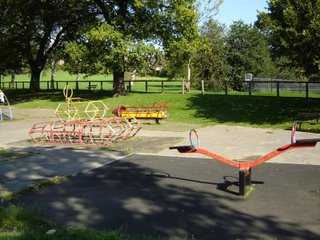


 and here's Gledhow Woods in the Leeds suburbs:
and here's Gledhow Woods in the Leeds suburbs: I don't know why dappled woodland is so pleasing to the eye: perhaps it was that our woodland-dwelling ancestors liked it when they came out of the gloom of the forest into a clearing. Perhaps it's because they could see better and they could see that nothing was coming to eat them.
I don't know why dappled woodland is so pleasing to the eye: perhaps it was that our woodland-dwelling ancestors liked it when they came out of the gloom of the forest into a clearing. Perhaps it's because they could see better and they could see that nothing was coming to eat them.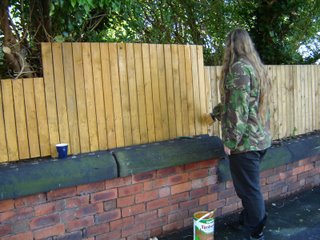


 The river's quite wide here and you would never think that, just a few miles downstream near Bolton Abbey, it almost turns on its side to flow through the Strid.
The river's quite wide here and you would never think that, just a few miles downstream near Bolton Abbey, it almost turns on its side to flow through the Strid.




 This duck, and some of its friends, lives just outside the Blue Bell Inn in Kettlewell. The door is wide open and the ducks were all clustered outside. So why, asked my friend David, do they not go into the pub?
This duck, and some of its friends, lives just outside the Blue Bell Inn in Kettlewell. The door is wide open and the ducks were all clustered outside. So why, asked my friend David, do they not go into the pub? 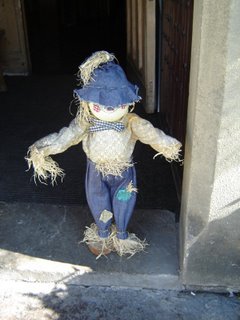
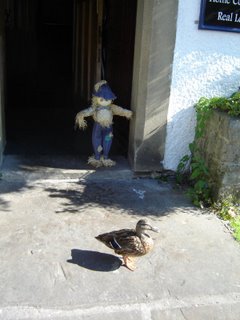
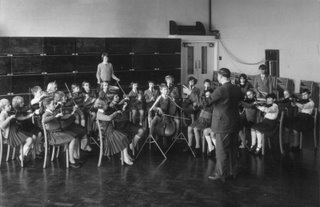
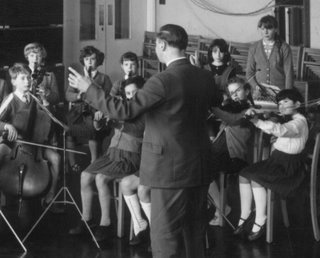 Now then. Just above Mr. Allen's left hand is a girl blowing the clarinet as hard as is humanly possible, and that is me. I didn't like my hairstyle then, and I don't like it now. The photo must have been taken just before a concert because I never wore school uniform usually: I hated it, (did I mention that I still hate it?) and it wasn't compulsory, thank goodness. I particularly hated wearing the tie - and when this photo was taken, I had another seven or eight years of tie-wearing to look forward to, O lucky girl!
Now then. Just above Mr. Allen's left hand is a girl blowing the clarinet as hard as is humanly possible, and that is me. I didn't like my hairstyle then, and I don't like it now. The photo must have been taken just before a concert because I never wore school uniform usually: I hated it, (did I mention that I still hate it?) and it wasn't compulsory, thank goodness. I particularly hated wearing the tie - and when this photo was taken, I had another seven or eight years of tie-wearing to look forward to, O lucky girl! There is the beautifully-restored Victorian steam yacht Gondola:
There is the beautifully-restored Victorian steam yacht Gondola: Gondola moves about the lake almost silently, producing clouds of steam: she is a very peaceful way to travel. Although I prefer to sit outside and see the fells, the interior, with its leather seats, is lovely too.
Gondola moves about the lake almost silently, producing clouds of steam: she is a very peaceful way to travel. Although I prefer to sit outside and see the fells, the interior, with its leather seats, is lovely too.
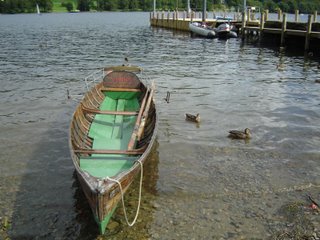 And here I am, in a photo taken a little while ago now, messing about in a boat very like the one on Coniston. I’m not sure where the photo was taken, but I’m sitting next to the Communist, though few would recognise him without the beard he’s had since about 1970.
And here I am, in a photo taken a little while ago now, messing about in a boat very like the one on Coniston. I’m not sure where the photo was taken, but I’m sitting next to the Communist, though few would recognise him without the beard he’s had since about 1970. I was four, and blind as a bat, though nobody knew at the time, including me, because I didn’t have my eyes tested until I was five. This is why I am peering at the camera with well-meaning incomprehension.
I was four, and blind as a bat, though nobody knew at the time, including me, because I didn’t have my eyes tested until I was five. This is why I am peering at the camera with well-meaning incomprehension. 